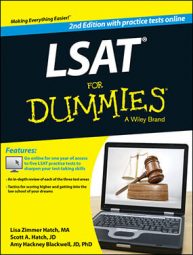Every LSAT includes a section of questioning called logical reasoning. You will be asked to read a passage and choose the best answer from the choices. Try a few for practice.
Logical reasoning sample questions
A cosmetics company did a study of hair colors involving 100 women, all of whom dyed their hair with the same product. Half of them then washed their hair with special shampoo made for color-treated hair, and half of them washed their hair with ordinary shampoo. After two months, there was no difference in color fading between the two groups. Therefore, shampoo for color-treated hair is valueless.
Which one of the following statements, if true, most seriously weakens the argument?
(A) Most shampoos contain the same basic ingredients, such as sodium lauryl sulfate or sodium laureth sulfate.
(B) Most hair experts recommend touching up hair color every four to six weeks.
(C) Both groups had equal numbers of women in their 30s, 40s, and 50s, with comparable natural hair colors.
(D) The women who had used shampoo for color-treated hair had softer and shinier hair than the women who used ordinary shampoo.
(E) Hair color technology has improved tremendously in the last ten years, making it possible for all women to successfully color their hair at home.
Dermatologist: Many people believe they can prevent acne by using clay masks to draw impurities from pores and applying toner, which they think will prevent dirt from entering pores. If this were true, then acne would be easy to treat with topical measures. In fact, acne blemishes develop within the skin itself and are affected by internal factors such as hormones and sebum. Therefore, using external measures is useless.
The dermatologist's conclusion follows logically if which one of the following is assumed?
(A) Clay masks can dry out the skin.
(B) Some people like the sensation of toners on their skin.
(C) Dirt on the skin does not cause acne.
(D) Doctors have successfully treated acne with oral antibiotics.
(E) Most dermatologists recommend that patients clean their faces with gentle soap instead of harsh cleansers.
American citizens believe that they live in a democracy. In presidential elections, though, citizens do not get to vote for president. They can only choose electors who cast votes for president on behalf of entire states. Therefore, Americans do not actually live in a democracy.
Which one of the following exhibits a pattern of reasoning most similar to the one in the argument presented here?
(A) Most colleges have student government. All students are allowed to vote in student government elections. In fact, though, very few students vote or take any interest in student government affairs. Therefore, student government serves no useful purpose.
(B) All cities have local law enforcement programs. Usually, the police handle crime in the city, the sheriff's department handles county matters, and the state police handle matters that affect the entire state. Therefore, most cities have too much duplication of law enforcement jobs.
(C) The United States is said to have a free market economy. In fact, though, the U.S. economy is heavily regulated by the government, which gives many advantages to large businesses and punishes small companies and the self-employed. Therefore, the United States does not really have a free market economy.
(D) Most teachers believe that education courses are valuable. Many colleges and universities, on the other hand, look down on education degrees. Therefore, future teachers should not major in education.
(E) Most health insurers claim to offer their customers a variety of choices in health care. Doctors, however, do not post a menu of prices for customers to peruse before accepting treatment, and patients in hospitals do not get to choose the doctors who treat them. Therefore, health insurers are dishonest.
People usually meet expectations. Thus, if Person A informs Person B that he or she is expected to perform a particular duty and Person B accepts that duty, generally, Person B will perform the duty as expected.
Which one of the following best illustrates this proposition?
(A) A teacher informs a girl that she is responsible for feeding the class hamster every morning, and the girl agrees to do this. After this, the girl feeds the hamster every morning without the teacher telling her to.
(B) A partner asks an associate to write a memo on a legal issue. Because the associate is inexperienced, the partner supervises his work closely and helps him write several drafts of the memo.
(C) Country A has agreed to be Country B's military ally. Country A then elects a new president who disagrees with Country B's policies, and when Country B goes to war, Country A refuses to help.
(D) A coach teaches his players a particular strategy. The first time they use it in a game, they win. Thereafter, they go on to win the league championship.
(E) A psychologist tells a patient that behavior modification will help her quit smoking. The patient follows the program designed by the psychologist and quits smoking successfully.
Answers
D. The women who had used shampoo for color-treated hair had softer and shinier hair than the women who used ordinary shampoo.
C. Dirt on the skin doesn't cause acne.
C. The United States is said to have a free market economy. In fact, though, the U.S. economy is heavily regulated by the government, which gives many advantages to large businesses and punishes small companies and the self-employed. Therefore, the United States doesn't really have a free market economy.
A. A teacher informs a girl that she is responsible for feeding the class hamster every morning, and the girl agrees to do this. After this, the girl feeds the hamster every morning without the teacher telling her to.

